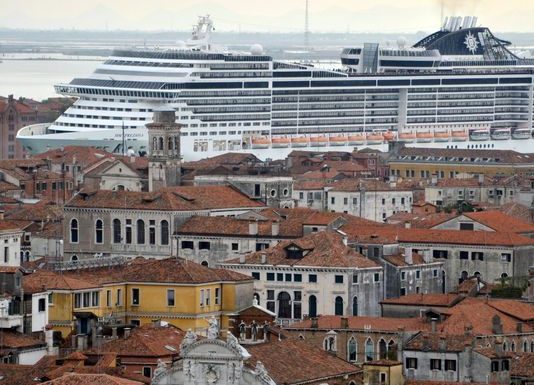

Rather than making the usual predictions, this year I’m raising some of the really big questions that travelers and the travel industry are likely to face in 2018 travel. You may not see many final answers to these questions in 2018, but you can certainly expect the beginning of some important actions. Here’s what to watch out for in 2018 travel.
Will destinations address over-tourism in 2018 travel?
After simmering under the radar for decades, the problem of over-tourism has suddenly become a hot topic — maybe even the year’s hottest travel topic. Nobody denies the problem; the big question is how impacted areas will try to manage it and how future changes will affect 2018 travel.
Chances are you’ve experienced over-tourism already: Wall-to-wall people in St. Mark’s Square, a shipload of 5,000 cruise passengers descending on tiny Skagway, bumper-to-bumper traffic at Yosemite National Park. It’s a world-wide problem. But how do we fix it? You can’t tell people to skip Venice and visit Parma instead because Venice is too crowded; you can’t find the features of any world-class destination anywhere else. We can’t install turnstiles everywhere: Anything too draconian will generate strong opposition from locals whose livelihood is tourism.
You can, however try to “encourage” off-season visits, while it is inevitably limited by both climate and schedules. Certainly, pricing will have to enter that picture: Destinations can increase hotel, restaurant and attraction prices, or at least make them more seasonal. Cruise ship and other arrivals can also be limited, but none will be simple or easy.
Over-tourism is already damaging the allure of many popular destinations. The big questions revolve around what leaders in the impacted areas will do, when they will do it, and how their decisions will affect travelers. I don’t have answers, but you’re likely to see some adjustments begin with 2018 travel.
What more will airlines do to incentivize direct buying?
Why do airlines want you to buy your tickets directly instead of through an online travel agency (OTA) such as Expedia or Priceline? They avoid paying commission to a middleman, and they’re better able to offer you a bunch of “upgrade” and bundle options. Currently, they’re fighting proposed regulations that require them to provide more information to OTAs about prices for items like checked bags and seat assignments.
Big hotel chains have gone a similar way: Limit access to “free” Wi-Fi to travelers who book direct; make people who book through an OTA pay $10 a day or more. Some also offer discounts to loyalty program members, but those are usually pretty small. Still, that free Wi-Fi limit is obviously drawing lots of travelers to the hotel chains’ own websites.
Can airlines do something like that? They could, for example, limit frequent-flier mileage and status benefits to travelers who book direct. I haven’t seen anybody suggesting that yet, but it would be a big pull. Keep watching.
Will travelers lose more consumer protections?
Anyone looking at this topic right now might answer “duh.” The current administration campaigned on reducing or eliminating regulations, and what little consumer protections exist are currently implemented through government regulation.
A realistic observer might rephrase the question as, “What consumer protections do we stand to lose?” And that’s not trivial: Big airlines are already attacking two important consumer protections. They want to eliminate the requirement for up-front fare pricing, and the 24-hour free cancellation requirement that allows you to lock in one deal while still searching for a better one. Will the Department of Transportation cave? It could affect 2018 travel.
Is ‘hyperloop’ train travel for real?
So far, the idea of hyperloop train travel has mainly been just “hype.” But now some big names are backing some serious proposals for a tube tunnel-based transportation system that they claim can beat both the speeds and the costs of standard high-speed rails. The claims may sound out there, but if they materialize they would lead to a revolution in mid-range travel: up to 500 miles or so away.
Certainly, even conventional high-speed rail beats flying in terms of comfort and convenience, but a new even faster, even cheaper system could reshape the nation’s transportation system. You won’t be riding any hyperloop train lines in 2018, but you might see big companies commit to actually starting to build one.
Will the loss of net neutrality impact travel buying?
Even the Internet geeks don’t seem to know exactly how removing net neutrality regulations will actually come to affect ordinary consumers. But, clearly, anything that substantially impacts the Internet will impact travel. And you somehow get the feeling that any substantial impact is likely to disadvantage, not help, consumers.
When will OTAs list true, overall hotel prices?
If you want to compare the costs of renting a car, a quick check with Priceline’s rentalcars.com or any other similar OTA returns rates that include base charges, airport surcharges, local taxes, road and license fees, and any other applicable fees from the get-go. You don’t even see a breakdown of base rates and tax/fee items; what you see is what you pay.
And that capability raises the obvious question: If OTAs can present aggregated, fee- and tax-inclusive car rental rates, why can’t they present fee- and tax-inclusive hotel rates, too? A few years back, a small and long-forgotten metasearch system started to do just that, but it quickly disappeared without any real explanation.
Other consumer advocates and I have been nagging the Federal Trade Commission and individual state attorneys general to tackle the obvious deception of “resort” and other mandatory hotel fees. But if Expedia or Priceline were to present inclusive prices, nobody would need any governmental intervention. I wonder just why those or other OTAs don’t do just that, and maybe some finally will grant it for 2018 travel.
Obviously, consumers need more than just an explanation. Travelers need them to take action. But will they?
COURTESY= usatoday.com

